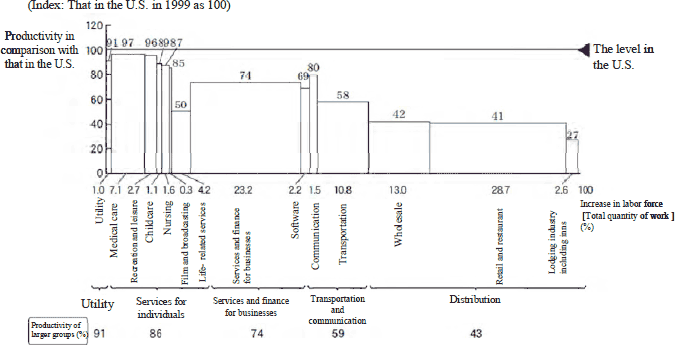In present Japan, the rate of the service industry, rather than manufacturing industry, is increasing in both the GDP and number of workers. Especially, the rate of workers in the narrow sense of service industry such as medical care, welfare, and business service is increasing. In the recent economic growth, service industries have played a role of accepting employees from manufacturing industries who were laid off due to the improvement of production efficiency, and decline in the productivity of service industries has become conspicuous with the increase in labor force. It is pointed out that improvement of labor productivity is the key for Japan's economic growth in the future.
Comparing the productivity of service industries in Japan with those in the U.S., in every field, it is lower. It is especially low in wholesale, retail, restaurant, and lodging industry including inns. If the productivity of Japan's service industry continues to be low as it is, the productivity of the entire macro economy may see sluggish growth and may lead to a decline in international competitiveness.
It is considered that in service areas for which productivity is low from an international viewpoint, innovation by science and technology may greatly contribute towards improvement of international competitiveness. Furthermore, it is expected that excellent results of human and social science related to science and technology may contribute to adding high value to the manufacturing industry. For these reasons, it is important, for promoting innovation, to develop human and social science and to integrate that knowledge with natural science.
The comparison between the productivity of service industries in Japan and those in the U.S.

Source:
Ministry of Economy, Industry, and Trade “Input-Output
Table,” Ministry of Internal Affairs and Communications "Labor Force Survey,"
BEA "Industry Accounts," BEA "NIPA Tables," and McKinsey
analysis
Reference:
"Survey research and factor analysis on the productivities
of tertiary industries in Japan and the U.S." by the Japan Industrial Policy
Research Institute and McKinsey & Company, Inc., Japan
Contacts
Research and Coordination Division, Science and Technology Policy Bureau
(Research and Coordination Division, Science and Technology Policy Bureau)




